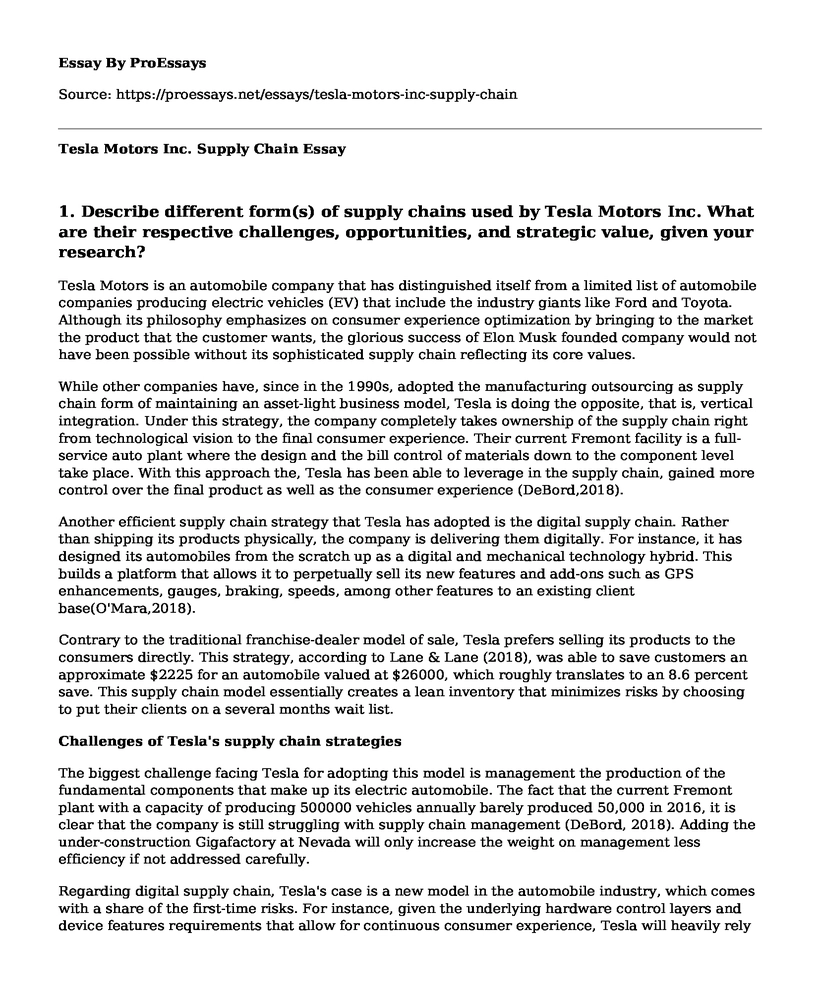1. Describe different form(s) of supply chains used by Tesla Motors Inc. What are their respective challenges, opportunities, and strategic value, given your research?
Tesla Motors is an automobile company that has distinguished itself from a limited list of automobile companies producing electric vehicles (EV) that include the industry giants like Ford and Toyota. Although its philosophy emphasizes on consumer experience optimization by bringing to the market the product that the customer wants, the glorious success of Elon Musk founded company would not have been possible without its sophisticated supply chain reflecting its core values.
While other companies have, since in the 1990s, adopted the manufacturing outsourcing as supply chain form of maintaining an asset-light business model, Tesla is doing the opposite, that is, vertical integration. Under this strategy, the company completely takes ownership of the supply chain right from technological vision to the final consumer experience. Their current Fremont facility is a full-service auto plant where the design and the bill control of materials down to the component level take place. With this approach the, Tesla has been able to leverage in the supply chain, gained more control over the final product as well as the consumer experience (DeBord,2018).
Another efficient supply chain strategy that Tesla has adopted is the digital supply chain. Rather than shipping its products physically, the company is delivering them digitally. For instance, it has designed its automobiles from the scratch up as a digital and mechanical technology hybrid. This builds a platform that allows it to perpetually sell its new features and add-ons such as GPS enhancements, gauges, braking, speeds, among other features to an existing client base(O'Mara,2018).
Contrary to the traditional franchise-dealer model of sale, Tesla prefers selling its products to the consumers directly. This strategy, according to Lane & Lane (2018), was able to save customers an approximate $2225 for an automobile valued at $26000, which roughly translates to an 8.6 percent save. This supply chain model essentially creates a lean inventory that minimizes risks by choosing to put their clients on a several months wait list.
Challenges of Tesla's supply chain strategies
The biggest challenge facing Tesla for adopting this model is management the production of the fundamental components that make up its electric automobile. The fact that the current Fremont plant with a capacity of producing 500000 vehicles annually barely produced 50,000 in 2016, it is clear that the company is still struggling with supply chain management (DeBord, 2018). Adding the under-construction Gigafactory at Nevada will only increase the weight on management less efficiency if not addressed carefully.
Regarding digital supply chain, Tesla's case is a new model in the automobile industry, which comes with a share of the first-time risks. For instance, given the underlying hardware control layers and device features requirements that allow for continuous consumer experience, Tesla will heavily rely on vertical integration model for the core technologies, which as mentioned above is still a struggling area for the company's management (Gittins, 2018).
Tesla's move to distribute their products directly to the consumers faces huge resistance not only from the outmoded monopolies of the car dealers but also from the states' legislation, which prohibits sales other than from licensed franchisee. The company has already faced court defeats such as the one against New Jersey Motor Vehicle Commission (NJMVC) that led to the closure of their two stores located in Garden State (Lane & Lane, 2018).
Opportunities and strategic values
While inefficient management of several plants manufacturing core components of an electric car seems to be the most challenging factor in Tesla's supply chain model, vertical integration could work for the company for the positive. Considering EV is relatively a new venture in the automobile industry, a bottom-up building will not only increase their production rate but also, it will give them an earn them more control of quality output hence a bigger market share compared to its competitors.
References
DeBord, M.(2018).Tesla has to overcome a major problem for its massive new Gigafactory to succeed. Business Insider. Retrieved 14 March 2018, from http://www.businessinsider.com/tesla-has-to-overcome-a-major-problem-for-its-massive-new-gigafactory-to-succeed-2016-7?IR=T
Gittins, P.(2018).Tesla, big data and industrial disruption - Capgemini Worldwide. Capgemini.com. Retrieved 14 March 2018, from https://www.capgemini.com/2015/09/tesla-big-data-and-industrial-disruption/
Lane, C., & Lane, C. (2018). Charles Lane: Tesla takes on car dealerships in a fight to the death. Washington Post. Retrieved 13 March 2018, from https://www.washingtonpost.com/opinions/charles-lane-tesla-takes-on-car-dealerships-in-a-fight-to-the-death/2014/03/12/2956a9f2-a9ff-11e3-8599-ce7295b6851c_story.html?utm_term=.d816c26d6d7b
O'Mara,K.(2018).Forbes Welcome.Forbes.com. Retrieved 14 March 2018, from https://www.forbes.com/sites/kevinomarah/2016/04/07/tesla-and-the-21st-century-supply-chain/3/#4ff3f7424856
Cite this page
Tesla Motors Inc. Supply Chain. (2022, Apr 04). Retrieved from https://proessays.net/essays/tesla-motors-inc-supply-chain
If you are the original author of this essay and no longer wish to have it published on the ProEssays website, please click below to request its removal:
- Pricing and Retail Strategy
- Konecranes: Assignment Sample
- Intelligence Community Organization and Careers Essay
- Developing a Marketing Plan at BizOps Enterprises Paper Example
- Building and Marketing High Performing Organizations: Applying the EFQM Model of Excellence on Boeing
- Research Paper on Leadership Models: Navigating Diversity and Complexity in Organizations
- Tencent's Rise: Leadership, Change Management and Restructuring - Essay Sample







